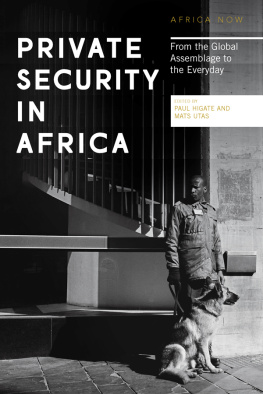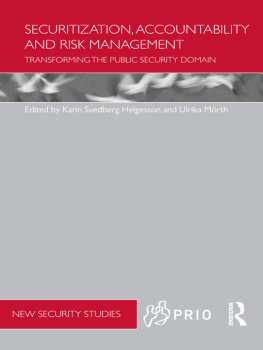
More praise for Private Security in Africa
Ranging from secret societies in Sierra Leone to private security companies in South Africa, this important book provides a major contribution to the theory and practical understanding of the everyday experience of private security across Africa.
Paul Jackson, University of Birmingham
Higate and Utas have produced a cohesive collection of insightful essays on the politics of private security in Africa (and beyond). Theoretically sophisticated and empirically informed, this impressive volume will be the baseline for future scholarship for years to come.
Kevin Dunn, Hobart and William Smith Colleges
The global trend of privatising security has received little systematic attention. This highly recommended book starts to close this gap and raises important questions about what this means for the role of the state in this age of uncertainty.
Morten Bs, Norwegian Institute of International Affairs
Through the adoption of an ethnographic lens, this volume provides a compelling account of everyday private security practices and the kaleidoscopic configurations within which they blend and assemble.
Daniel C. Bach, Sciences Po Bordeaux (emeritus)
Africa Now
Africa Now is published by Zed Books in association with the internationally respected Nordic Africa Institute. Featuring high-quality, cutting-edge research from leading academics, the series addresses the big issues confronting Africa today. Accessible but in-depth, and wide-ranging in its scope, Africa Now engages with the critical political, economic, sociological and development debates affecting the continent, shedding new light on pressing concerns.
Nordic Africa Institute
The Nordic Africa Institute (Nordiska Afrikainstitutet) is a centre for research, documentation and information on modern Africa. Based in Uppsala, Sweden, the Institute is dedicated to providing timely, critical and alternative research and analysis of Africa and to co-operation with African researchers. As a hub and a meeting place for a growing field of research and analysis the Institute strives to put knowledge of African issues within reach for scholars, policy makers, politicians, media, students and the general public.
www.nai.uu.se
Forthcoming titles
Anders Themnr (ed.), Warlord Democrats in Africa
Mimmi Sderberg Kovacs and Jesper Bjarnesen (eds), Violence in African Elections
Atakilte Beyene (ed.), Agricultural Transformation in Ethiopia
Titles already published
Fantu Cheru and Cyril Obi (eds), The Rise of China and India in Africa
Ilda Lindell (ed.), Africas Informal Workers
Iman Hashim and Dorte Thorsen, Child Migration in Africa
Prosper B. Matondi, Kjell Havnevik and Atakilte Beyene (eds), Biofuels, Land Grabbing and Food Security in Africa
Cyril Obi and Siri Aas Rustad (eds), Oil and Insurgency in the Niger Delta
Mats Utas (ed.), African Conflicts and Informal Power
Prosper B. Matondi, Zimbabwes Fast Track Land Reform
Maria Eriksson Baaz and Maria Stern, Sexual Violence as a Weapon of War?
Fantu Cheru and Renu Modi (eds), Agricultural Development and Food Security in Africa
Amanda Hammar (ed.), Displacement Economies in Africa
Mary Njeri Kinyanjui, Women and the Informal Economy in Urban Africa
Liisa Laakso and Petri Hautaniemi (eds), Diasporas, Development and Peacemaking in the Horn of Africa
Margaret Lee, Africas World Trade
Godwin R. Murunga, Duncan Okello and Anders Sjgren (eds), Kenya: The Struggle for a New Constitutional Order
Lisa kesson and Maria Eriksson Baaz (eds), Africas Return Migrants
Thiven Reddy, South Africa: Settler Colonialism and the Failures of Liberal Democracy
Cedric de Coning, Linna Gelot and John Karlsrud (eds), The Future of African Peace Operations
Tobias Hagmann and Filip Reyntjens (eds), Aid and Authoritarianism in Africa
Henning Melber (ed.), The Rise of Africas Middle Class
Private security in Africa
From the global assemblage to the everyday
edited by Paul Higate and Mats Utas

Zed Books
LONDON
Private Security in Africa: From the Global Assemblage to the Everyday was first published in association with the Nordic Africa Institute, PO Box 1703, SE-751 47 Uppsala, Sweden in 2017 by Zed Books Ltd, The Foundry, 17 Oval Way, London SE11 5RR, UK
www.zedbooks.net
www.nai.uu.se
Editorial copyright Paul Higate and Mats Utas 2017
Copyright in this collection Zed Books 2017
The rights of Paul Higate and Mats Utas to be identified as the editors of this work have been asserted by them in accordance with the Copyright, Designs and Patents Act, 1988
Typeset in Minion Pro by seagulls.net
Index: Rohan Bolton
Cover design: Alice Marwick
Cover photo Marc Shoul/Panos
All rights reserved. No part of this publication may be reproduced, stored in a retrieval system or transmitted in any form or by any means, electronic, mechanical, photocopying or otherwise, without the prior permission of Zed Books Ltd.
A catalogue record for this book is available from the British Library
ISBN 978-1-78699-026-6 hb
ISBN 978-1-78699-025-9 pb
ISBN 978-1-78699-028-0 pdf
ISBN 978-1-78699-027-3 epub
ISBN 978-1-78699-029-7 mobi
Contents
PAUL HIGATE
RITA ABRAHAMSEN AND MICHAEL WILLIAMS
WILLIAM RENO
PETER ALBRECHT
MAYA MYNSTER CHRISTENSEN
TESSA DIPHOORN
MARCUS MOHLIN
JACOB RASMUSSEN
PEER SCHOUTEN
MATS UTAS
Acknowledgements
In December 2013 a workshop entitled Private Security Providers in Conflict Environments Transitional Actors or Active Influencers was held at the Crowne Plaza Hotel in Nairobi. The workshop brought together a number of established scholars and practitioners with expertise on the provision of private security on the continent of Africa. While we would have very much liked to have included all of the excellent contributions from the workshop, this has not been possible as we selected those pieces that chimed most closely with the theme of the global security assemblage. The event was generously supported by the World Bank and the Center on Conflict, Security and Development and the Nordic Africa Institute. Much was learned over those few days, not least that the continent remains largely overlooked from an ethnographic perspective when it comes to questions of private security provision. The editors would like to thank the following whose input, help and assistance either directly or indirectly have made the current volume possible: Rita Abrahamsen, Peter Albrecht, Lydia Amedzrator, Maya Mynster Christensen, Markus Derblom, Tessa Diphoorn, Susanna Dukaric, Annika Franklin, Marsha Henry, Mathias Krger, Marcus Mohlin, Ruth Mwangi, Henri Myrttinen, Jacob Rasmussen, Will Reno, Peer Schouten and Leila Stockmarr. We would also like to thank Nivi Manchanda and Ilmari Kihk for commenting on earlier drafts of the introduction and epilogue and, finally, Ken Barlow at Zed for his patience and work on the manuscript.
Paul Higate
Mats Utas
Note: A version of by Maya Christensen appeared in African Affairs with the same title, The underbelly of global security: Sierra Leonean ex-militias in Iraq, African Affairs , doi: 10.1093/afraf/adv055.
Introduction
Paul Higate
While the wider literature on private security provision has developed both theoretically and empirically in recent years, the nefarious activities of Executive Outcomes and its mercenary operatives in Sierra Leone through the 1990s are rarely far from discussion of private security on the continent of Africa. Here, the mercenary caricature continues to loom large in elements of this literature in ways that align private security with force, militarism and violence. Inflected with the spectre of the fragile state, and seen through the lens of profit, narcissm, underdevelopment and ungovernability, these narratives function at the level of common sense to constitute a crude inside/outside binary where the (African) latter is incomplete and found wanting as a distant entity with which we have little in common (directly to the call for the continent to be studied both in its own right, and as an entity enmeshed in wider relationships. As one way in which to analyse localized manifestations of power with seemingly distant, yet nonetheless immediately present, national and international normativities, the volume engages the global assemblage framework (ibid.: 38146). Complex and fluid networks through and by which assemblages are configured are largely invisible to consumers and perhaps less so providers, yet remain visceral in their sometimes violent materiality. Ultimately, these hybridized forms of governance seek order in the name of capital accumulation, a logic that comes into sharpest relief when we consider the resource extraction sector in Nigeria and Sierra Leone. Here we note extreme forms of explicitly militarized private security provision in contexts of inequality, social injustice and violence (ibid.).
Next page








